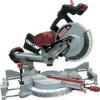Craftsman 21221 Operation Manual - Page 66
rated the same as the current stamped
 |
View all Craftsman 21221 manuals
Add to My Manuals
Save this manual to your list of manuals |
Page 66 highlights
now be started and the cut finished. 4. FUSES may "blow" or circuit breakers may trip frequently if: a. MOTOR is overloaded - overloading can occur if you feed too rapidly or make too many start/stops in a short time. b. LINE VOLTAGE is more than 10% above or below the nameplate voltage rating. For heavy loads, the voltage at motor terminals must equal the voltage specified on the nameplate. c. IMPROPER or dull saw blades are used. 5. Most motor troubles may be traced to loose or incorrect connections, overload, low voltage or inadequate power supply wiring. Always check the connections, the load and supply circuit if the motor doesn't run well. Check minimum gauge for the length of cord you are using on the chart below. excessive heat and damp or wet areas. Use a separate electrical circuit for your tools. This circuit must not be less than a #12 wire with a 20 A time lag fuse or a #14 wire with a 15 A time lag fuse. NOTE: When using an extension cord on a circuit with a #14 wire, the extension cord must not exceed 25 feet in length. Before connecting the tool to the power line, make sure the switch is in the OFF position and the electric current is rated the same as the current stamped on the motor nameplate, running at a lower voltage will damage the motor. I,V_ll#lhVIjll Lv|j€f._11[_1 =11=[0] t,i _:Q i =1#{..I [el #El.ill ;I I]._fzViVL_l (When using 120 volts only) Ampere Rating Total length of Cord More Than O Not More Than 25ft. 50ft. 6 18 16 100ft. 150ft. 16 14 6 10 18 16 14 12 10 12 16 16 14 12 GUIDELINES FOR EXTENSION CORDS Use a proper extension cord. Make sure your extension cord is in good condition. When using an extension cord, be sure to use one heavy enough to carry the current your product will draw. An undersized cord will cause a drop in line voltage, resulting in loss of power and overheating. The table below shows the correct size to use depending on cord length and nameplate ampere rating. If in doubt, use the next heavier gauge. The smaller the gauge number, the heavier the cord. CAUTION: In all cases make certain the receptacle in question is properly grounded. If you are not sure, have a certified electrician check the receptacle. Be sure your extension cord is properly wired and in good condition. Always replace a damaged extension cord or have it repaired by a qualified person before using it. Protect your extension cords from sharp objects, 10















